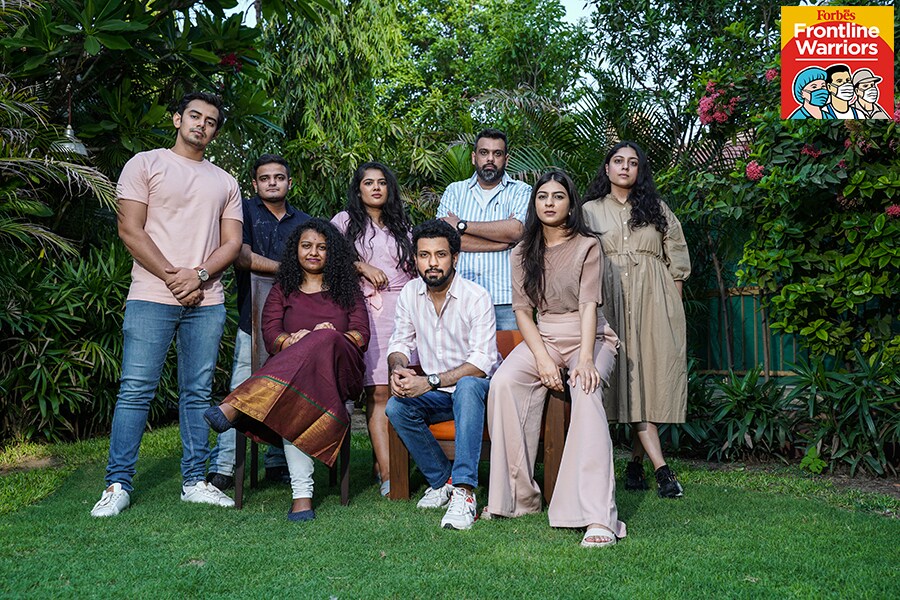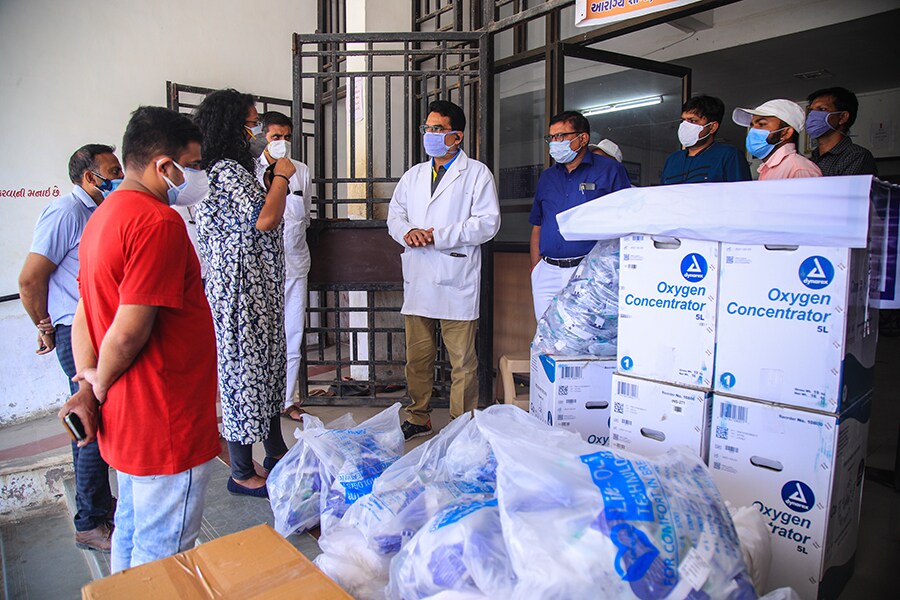
Covid-19 Warriors: Ahmedabad's angels ensure there is no shortage of medical supplies and food in rural Gujarat
Team Sahaay spread its medical and community efforts in the hamlets as coronavirus cases began to surge in the interiors of the state
 Covid-19 Warriors Team Sahaay (From left) Devarshi Shah, Karan Ghoda, Zeal Shah, Shaili Shah, Mitra Gadhvi, Rohan Bhatt, Saloni Mehta and Shirali Shah; Image: Ved Dave
Covid-19 Warriors Team Sahaay (From left) Devarshi Shah, Karan Ghoda, Zeal Shah, Shaili Shah, Mitra Gadhvi, Rohan Bhatt, Saloni Mehta and Shirali Shah; Image: Ved Dave
Zeal Shah, 28, checked the car thoroughly to ensure it was loaded with all the essentials needed at a hospital—oxygen concentrators, multipara monitors, nebulizer masks, oximeters, covers to keep bodies and other basic Covid-19 resources. She drove to Khedbrahma, a small town in Gujarat’s Sabarkantha district, about 120 km from Ahmedabad, on June 2 where doctors and government officials welcomed her arrival with glee.
As coronavirus cases continued to mount in the hinterlands, the government hospital at Khedbrahma had run out of resources. What compounded the woes was that patients from nearby villages and districts were lining up at the hospital, leading to a shortage of basic medical equipment.
Shah is one of the eight members of ‘Team Sahaay’—born in the midst of the second wave of the pandemic. In mid-April, when the country faced an acute crisis, putting an unexpected load on the medical infrastructure, this group—complete strangers—united to help people by collecting and providing leads for oxygen beds, plasma, oxygen cylinders, ventilators and so on. Most of the members used their good reach on social media to amplify the messages.
What initially began with resources eventually extended to distributing food and ration kits, and even providing help in rural Gujarat as the hamlets were struggling to grapple with the virus. It was in the first week of May that Team Sahaay got the first request for help from a rural area. A volunteer from Danta, a small town in Banaskantha district, informed it about a shortage of resources at primary health care centres and community health centres.
“We visited the village, a four-hour drive from Ahmedabad, to understand the scenario. We found out that not only was there a lack of certain resources but shockingly, the hospitals were empty. There were hardly any patients. After speaking to a few volunteers, we got to know that the word ‘Covid’ was a taboo; the villagers did not even want to utter it… according to them, whoever went to hospital after testing positive, died!” explains Shah. ASHA workers were going door-to-door in the village, but they were only checking the patients’ temperature. Team Sahaay arranged pulse oximeters for them while the staff at the government hospital trained them on how to use them.




 On June 2, Team Sahaay delivered medical supplies to Khedbrahma, a small town in Gujarat’s Sabarkantha district with the help of Yuva Unstoppable; Image: Chirag Panchal
On June 2, Team Sahaay delivered medical supplies to Khedbrahma, a small town in Gujarat’s Sabarkantha district with the help of Yuva Unstoppable; Image: Chirag Panchal



